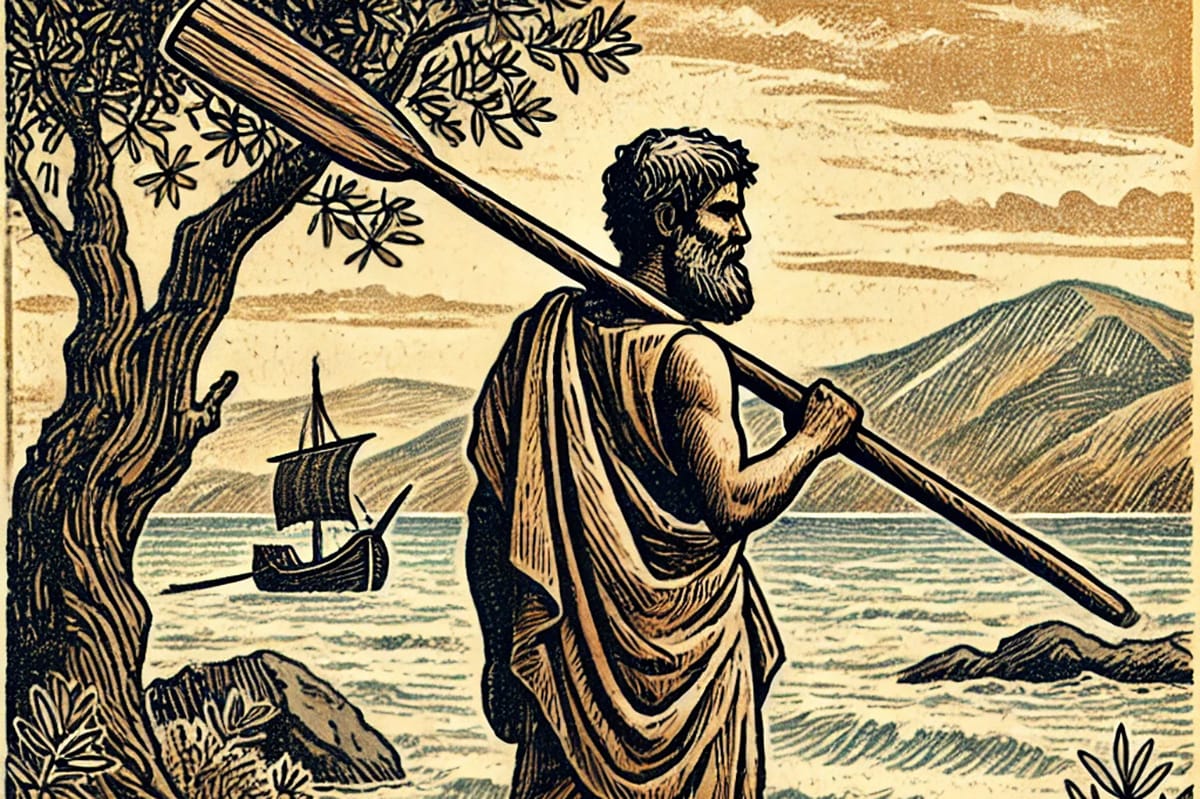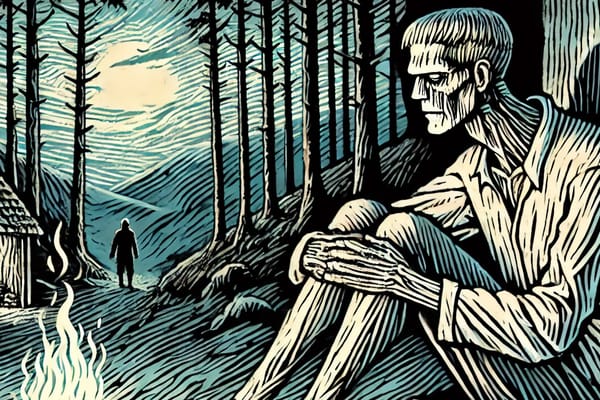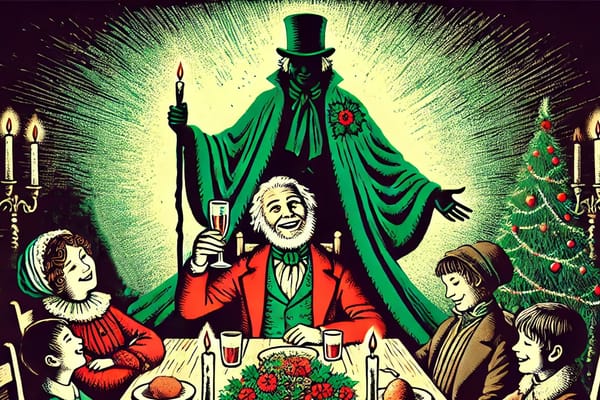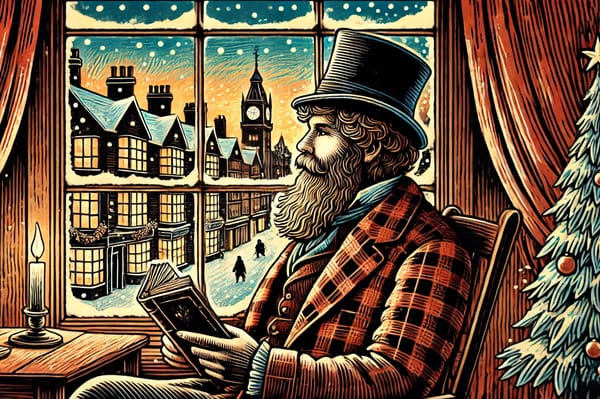Newsletter #1 - Take a Walk with The Wild Gentleman

Welcome to the first subscriber-only newsletter from The Wild Gentleman.
Glad to have you here.
Want to read on? You must be a subscriber. No worries, though, it's free to subscribe. (Click the little button below...)
Also, I want to thank everyone who has joined as a paid subscriber to help support The Wild Gentleman! I am forever grateful for your belief in this project and will be sharing some "Paid Subscriber ONLY" content soon.
You can check out the recent posts here:
"Welcome to the Wild Gentleman" - What this project is all about. To summarize: Love, Wisdom, Adventure, Community.
"Some Things We Lean Into, Some Things We Avoid" - In which I try to outline a philosophy of what The Wild Gentleman will strive towards and areas that (for now...) are not our jam.
"On Flaws" - I contain multitudes...and have made many mistakes. Oh, and let's look at the flawed hero Odysseus to remind ourselves that, for millennia, we humans (and men, in particular) have wrestled with exploring our faults.
Wild at Heart. Refined in Mind.
SUBSCRIBE or wander on!
The Wild Gentleman Book Club
The Wild Gentleman Book Club has launched.
I reached out to a small cohort to start the first month's Book Club and will be adding more folks gradually.
The goal is to read one book together per month and then meet to discuss it. This is the community aspect of what I am trying to build here and is something I feel is needed at the moment.
If you're interested, please email me at dennis@thewildgentleman.com.
One note on the book club:
I know everyone has a different reading style and, most importantly, time limits.
As this month we are reading The Great Gatsby (which can be ordered at The Wild Gentelman bookshop), you can access an audiobook version of F. Scott Fitzgerald's "Great American Novel" via Spotify above (I'd recommend listening between 1.5x and 1.7x to speed up this version if that's your jam. But you do you! I've already have a Gent reach out to tell me they digested it already at 3X!)
Passage I'm Still Thinking About
Last week, I finished the book Martyr by Kaveh Akbar.
First, this is a great read that explores art, family, and love in a way that only modern literature can (think, multiple narrative forms and voices). The story jumps across decades and years, moving from Tehran during the Iran-Iraq War, a seemingly dead-end Midwest college town, and a museum in Brooklyn.
In one section, presented as a book excerpt written by the protagonist—a digression about addiction—we get this gem of writing:
"When asked about the difficulties of sculpture, Michelangelo said, ’It is easy. You just chip away all the stone that isn’t David.’
It’s simple to cut things out of a life. You break up with a sh*tty partner, quit eating bread, delete the Twitter app. You cut it out, and the shape of what’s actually killing you clarifies a little. The whole Abrahamic world invests itself in this promise: Don’t lie, don’t cheat, don’t f*ck or steal or kill, and you’ll be a good person. Eight of the ten commandments are about what thou shalt not. But you can live a whole life not doing any of that stuff and still avoid doing any good. That’s the whole crisis. The rot at the root of everything. The belief that goodness is built on a constructed absence, not-doing. That belief corrupts everything, has everyone with any power sitting on their hands. A rich man goes a whole day without killing a single homeless person and so goes to sleep content in his goodness. In another world, he’s buying crates of socks and Clif bars and tents, distributing them in city centers. But for him, abstinence reigns.
I want to be the chisel, not the David. What can I make of being here? And what can I make of not?”
The last line makes a bit more sense in the context of the book. If you're looking for a quick, solid read, I implore you to try Martyr.
However, I wanted to share this because it touches on many things that I've been thinking about a lot, especially as they relate to the concept of "goodness."
I've read this a few times over now, and what resonates is this: "The belief that goodness is built on...not-doing."
There are instances when the concept of "constructed absence" contradicts what it actually means to be good. This is most true in love. Love is a very complex topic in the book. As it is, as we know, in life. Often, I have found myself thinking that it is loving to avoid tough conversations, or I imagine that those I love know my feelings even if they are unsaid across time and space. But the more I've shared my feelings of love (and its cousin, appreciation), even if it feels awkward, it is always appreciated.
I used the word "implore" above. I love these words. The deep actions. "Imbibe," is also a favorite. And I think there is a lot of good you can create out of doing. Step into that adventure that comes with taking a bold action. Tell someone you love them!
As Jimmy Buffett once sang, sharing love can be, "The difference between lightning/And a harmless lightnin' bug."
Send your thoughts if you have any on this passage. Would love to hear others' perspectives.
The Gentleman Shares
I am consistently falling victim to the charms of good and engaging writing. And so, in the spirit of sharing, let me help you avoid all the things you should be doing but won't.
Here are some great things I've read lately:
"WITNESS - Inside America's Death Chambers" - by Elizabeth Bruenig, The Atlantic.
I have always loved The Atlantic. To me, it is forever The Atlantic Monthly, borne from a Boston dinner party of distinguished gentlemen who got every penny they could from their middle names, including Ralph Waldo Emerson, Henry Wadsworth Longfellow, Oliver Wendell Holmes, James Russell Lowell, and more.
Of late, The Atlantic has been producing some incredible (newsworthy) journalism. This one will blow your doors off. Note: It is not for the faint-hearted.
"Are You Stuck in Movie Logic" - by Cate Hall, UsefulFictions, Substack.
The main takeaway: "Hopeful silence has corrosive effects."
I forget who recommended this, but it is excellent. The premise is that movies have an "unspoken rule that the characters aren’t allowed to communicate well." This leads to problems everyone tries to avoid until it is impossible.
Makes for a good film—bad life.
This is one of those newsletter pieces that outlines the problems with the premise and then gives steps to avoid this approach to life that you should probably avoid.
Alas, I find myself falling into this trap plenty.
But at least I am somewhat aware and can strive to make amends.
Upcoming...
Audiobooks? Book lists? The death of the literary man?




